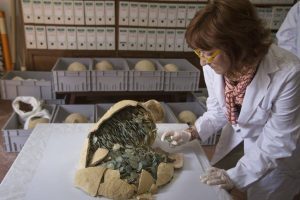57 projects will undertake excavations abroad and 115 Spanish sites will receive support for the analysis of archaeo-paleontological assets
In 2022, with its two calls for grants, 172 projects by Spanish researchers will be able to carry out their work

Roman oil mill of Henchir el Begar 2 (Kasserine region, Tunisia) Photo: IPAR Project, Spain – Institut National du Patrimoine, Tunisia
The Palarq Foundation, a private, non-profit foundation, has decided to subsidize a total of 57 projects for work to be carried out during the 2023 campaign. These are projects of Spanish teams located outside Spain and Europe, distributed in a total of 30 countries around the world.
On this occasion, most of the projects (33) are located on the African continent, in countries such as Egypt, Morocco or Tanzania. In Asia, there are 12 projects in countries like India, Iraq, Israel, Jordan or Kurdistan. South and Central America have 12 projects in Argentina, Chile, Ecuador, Mexico and Peru, while one mission is located in Oceania.
Here is the complete list of the subsidized projects.
Fundación Palarq, has been supporting since 2016 more than 500 Spanish teams working in the field of archaeology and human paleontology. Its mission is to support these teams abroad, outside Spain and Europe.
This 2022 we open, once again, a call for analytical techniques on archaeo-paleontological goods from a national site, 115 projects covering sites in the 17 Spanish regions, will have the necessary contribution to analyze the goods found in the sites.
DNA analysis to establish degrees of kinship, isotope analysis to determine the diet of our ancestors or paleoclimatic studies to know the climatic evolution of our planet, so in vogue today, help not only to understand our past but the present and can provide solutions for the future. The analyses carried out in prestigious national and international laboratories such as the national accelerator center of the CSIC in Seville or the Beta Analytic laboratory in the United States yield results that place Spanish research in these disciplines at the forefront of the world.

Reception of the Tomares Treasure (Seville) in the Archaeological Museum of Seville. Detail of amphora 11. The photo was taken by the Archaeological Museum of Seville
Some of the institutions responsible for these projects are the Atapuerca Foundation, the Consejo Superior de Investigaciones Científicas (CSIC), the Centro Nacional de Investigación sobre la Evolución Humana (CENIEH) or the Institut Català de Paleoecologia Humana i Evolució Social (IPHES), as well as some twenty universities, including the universities of Alicante, Almería, Barcelona, Burgos, Cantabria, Cádiz, Córdoba, Granada, Jaén, La Laguna, Santiago de Compostela, Valencia, the Universidad Complutense de Madrid, the Universitat Autònoma de Barcelona, the Universitat Pompeu Fabra and the UNED.
- Bite marks confirm gladiators fought lions at York (Heritage Daily 23/04/2025) - 24 April, 2025
- Ancient DNA challenges long-held assumptions about the Mediterranean Phoenician-Punic civilization (Phys.org 23/04/2025) - 24 April, 2025
- Neolithic agricultural revolution linked to climate-driven wildfires and soil erosion (Phys.org 22/04/2025) - 23 April, 2025



